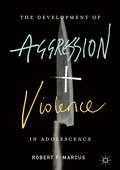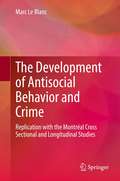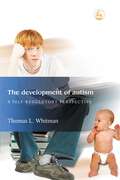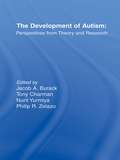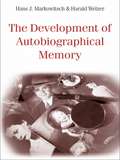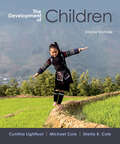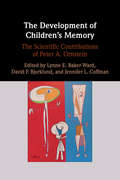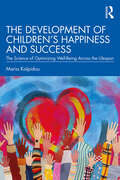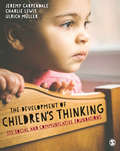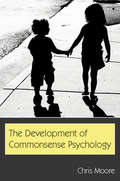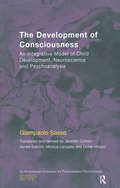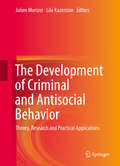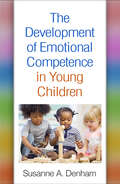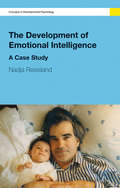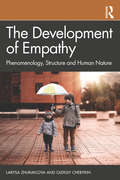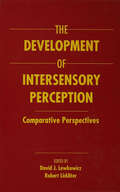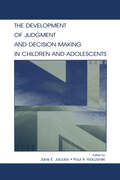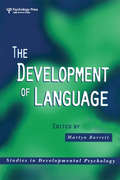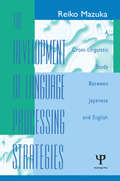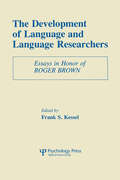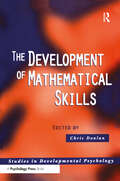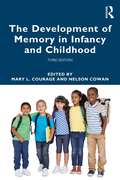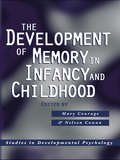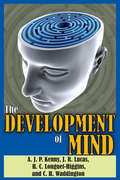- Table View
- List View
The Development of Aggression and Violence in Adolescence
by Robert F. MarcusThis book highlights the developmental changes in aggression and violence during adolescence from a uniquely psychological perspective. Developmental changes and risk factors as direct causes for violence and psychopathy have started to receive increased recognition over the last few years, and in this volume Marcus charts these changes against criminological activity. A meta-theoretical model consisting of developmental, personality, and situational factors which are common, or unique, to each form of aggression and violence are offered with research support. Empirically supported by rigorous data studies, this innovative work goes a long way towards addressing the methods of prevention by which we might lower the frequency and prevalence of aggression and violence. Well-researched and timely in its findings, this book will be of special interest to scholars of violence and crime, as well as developmental psychologists.
The Development of Antisocial Behavior and Crime: Replication with the Montreal Cross Sectional and Longitudinal Studies
by Marc Le BlancThis innovative and timely work explores how the developmental criminology paradigm can be applied to understandings beyond criminal careers, to the development of more general antisocial behavior. Importantly, the rich data set from 50-years of cross sectional and longitudinal studies provides replication amongst samples, genders, generations and phases in the life span, from cohorts born in the 1960s, 1970s, 1980s, and 1990s. This work also provides a rich history about the development of the “Developmental Criminology” paradigm, drawing from developmental psychology, and life-course methodologies in Sociology. With a 50-year, multigenerational longitudinal dataset (the Montreal Two Sample Four Generational Cross sectionnal and Longitudinal Studies –MTSFGCLS) the author explores the mechanisms of official and self-reported antisocial behavior. It provides insights into not only criminal behavior, but other types of potentially problematic behavior, including drug and alcohol use, risky sexual behavior, conflict with authority and other forms of antisocial behavior; as well as their decline across the life-course. By examining the developmental mechanisms and trajectories of these behaviors, the author proposes a multidisciplinary theory to explain these phenomenons. This work will be of interested to researchers in Criminology, Sociology and Psychology, particularly within the growing area of Developmental and Life-Course Criminology, as well as related fields such as social work, public health and public policy.
The Development of Autism: A Self-Regulatory Perspective
by Tom WhitmanTom Whitman proposes a new developmental theory of autism that focuses on the diversity of characteristics associated with this disorder, and how these develop over time. This theory is reconciled and integrated with contemporary theories of autism, including the social, cognitive, linguistic, sensorimotor and biological perspectives. The broader societal context in which autism emerges is also explored along with its impact on the family. Whitman draws from extensive clinical experience to examine common education and biomedical interventions and presents recommendations both for practical approaches to the everyday challenges of autism, and for future research. This comprehensive book is essential reading for parents, students, therapists, researchers and policymakers eager to improve or update their understanding of autism.
The Development of Autism: Perspectives From Theory and Research
by Jacob A. Burack Tony Charman Nurit Yirmiya Philip R. ZelazoDedicated to the memory and work of Lisa Capps, this volume is a forum for scholars and practitioners interested in the typical and atypical development of persons with autism. Each chapter is focused on theoretical considerations and the empirical evidence regarding a specific aspect of functioning, but common themes of development are considered throughout. Within this framework, the contributors provide a detailed and comprehensive account of the development of persons with autism. The book is divided into four sections: (1) Developmental, Neurobiological, Genetic, and Family Considerations; (2) Attention and Perception; (3) Cognition, Theory of Mind, and Executive Functioning; and (4) Social and Adaptive Behaviors. With the consideration of this broad range of topics, this volume is both a state-of-the-art resource about autism and a unique contribution to the study of development. It will be of interest to researchers and care providers from several domains, including psychology, psychiatry, social work, developmental psychology, and education. This volume can be used as a text in graduate and advanced undergraduate courses, and as a resource in applied settings.
The Development of Autobiographical Memory
by Harald Welzer Hans J. MarkowitschAutobiographical memory constitutes an essential part of our personality, giving us the ability to distinguish ourselves as an individual with a past, present and future. This book reveals how the development of a conscious self, an integrated personality and an autobiographical memory are all intertwined, highlighting the parallel development of the brain, memory and personality. Focusing strongly on developmental aspects of memory and integrating evolutionary and anthropological perspectives, areas of discussion include: why non-human animals lack autobiographical memory development of the speech areas in the brain prenatal and transnatal development of memory autobiographical memory in young children. This book offers a unique approach through combining both neuroscientfic and social scientific viewpoints, and as such will be of great interest to all those wanting to broaden their knowledge of the development and acquisition of memory and the conscious self.
The Development of Children
by Michael Cole Sheila Cole Cynthia LightfootThe Development of Children has long been acclaimed for its authoritative chronological exploration of how the lives of children are shaped by biological and cultural factors. In this thoroughly updated new edition, lead author Cynthia Lightfoot builds on the legacy of original authors Michael and Sheila Cole, offering a lively, engaging, and always accessible examination of child development as a process involving the whole child within multiple, mutually influencing contexts. Throughout, the emphasis is on how the interaction of biology and culture contributes both to the universal pathways of development shared by all children and to the diverse developmental patterns that unfold in the lives of individual children.
The Development of Children's Memory: The Scientific Contributions of Peter A. Ornstein
by David F. Bjorklund Baker-Ward, Lynne E. Jennifer L. CoffmanThis book provides an understanding of memory development through an examination of the scientific contributions of eminent developmental scientist Peter A. Ornstein. His fifty-year career not only coincided with but also contributed to a period of extraordinary progress in the understanding of children's memory. The volume describes this historical context, constructs a theoretical structure for understanding memory development, and emphasizes research applications for educational and forensic practice. Organized around Ornstein's four influential research programs in children's memory strategies, children's event memory, family socialization of memory, and classroom socialization of memory, the chapters examine contemporary directions in each area, with commentaries addressing each program provided by internationally renowned developmental psychologists. The book presents a comprehensive overview of memory development for psychologists and educators at all levels of training and practice, and also provides a model of a generative life in science.
The Development of Children’s Happiness and Success: The Science of Optimizing Well-Being Across the Lifespan
by Maria KalpidouThis engaging book is a comprehensive exploration of children's happiness and success covering a wide range of factors influencing positive functioning. It offers a holistic view of children’s well-being, identifying both threats and catalysts to happiness and success, as well as evidence-based strategies that promote optimal functioning. The first section of the book delves into the science of happiness, discussing the role of early social relationships, the importance of experiencing positive emotions and flow, spirituality, and physical health. The second section focuses on the science of success, exploring topics such as mindsets, self-control, and executive functions. Finally, the book explores individual and contextual factors explaining why character matters, the influence of media and technology, and the critical role of disadvantaged environments. Presenting happiness as an ongoing journey, intertwined with the pursuit and achievement of personal goals, the book concludes by proposing a new conceptual framework which identifies pivotal contributors to children's happiness and success such as relationships, self-regulation, and competence. Suited to upper-level undergraduate and graduate courses in child development, family studies, education, and positive psychology, this book is also an invaluable resource for caregivers, educators, and child practitioners. It is a must-read for anyone interested in cultivating a fulfilling, well-lived life for children and adolescents.
The Development of Children’s Thinking: Its Social and Communicative Foundations
by Ulrich Müller Charlie Lewis Jeremy CarpendaleThe Development of Children’s Thinking offers undergraduate and graduate students in psychology and other disciplines an introduction to several core areas of developmental psychology. It examines recent empirical research within the context of longstanding theoretical debates. In particular, it shows how a grasp of classic theories within developmental psychology is vital for a grasp of new areas of research such as cognitive neuroscience that have impacted on our understanding of how children develop. The focus of this book will be on infancy and childhood, and it looks at: Theories and context of development How developmental psychology attempts to reconcile influences of nature and nurture Communication in infancy as a precursor to later thinking Language development in primates and young children Cognitive and social development, including the child’s understanding of the mind How studies of moral reasoning reflect upon our understanding of development
The Development of Children’s Thinking: Its Social and Communicative Foundations
by Professor Jeremy Carpendale Professor Charlie Lewis Professor Ulrich MüllerThe Development of Children’s Thinking offers undergraduate and graduate students in psychology and other disciplines an introduction to several core areas of developmental psychology. It examines recent empirical research within the context of longstanding theoretical debates. In particular, it shows how a grasp of classic theories within developmental psychology is vital for a grasp of new areas of research such as cognitive neuroscience that have impacted on our understanding of how children develop. The focus of this book will be on infancy and childhood, and it looks at: Theories and context of development How developmental psychology attempts to reconcile influences of nature and nurture Communication in infancy as a precursor to later thinking Language development in primates and young children Cognitive and social development, including the child’s understanding of the mind How studies of moral reasoning reflect upon our understanding of development
The Development of Commonsense Psychology (Developing Mind Series)
by Chris MooreHow do children develop an understanding of people as psychological entities - as feeling, thinking beings? How do they come to understand human behavior as driven by desires and informed by reason? These questions are at the heart of contemporary research on children’s "theories of mind." Although there has been an enormous amount of research on this topic, nobody - until now - has provided a coherent account that traces the development of theory of mind from birth to five years. This book begins by analyzing the nature of commonsense psychology and exploring the developmental processes relevant to its development. It then describes the manner in which the child moves from being a newborn with perceptual sensitivities to people, to an infant who can share psychological experiences with others, to a young child who can recognize people, including both self and others, as individual psychological beings. Finally, the book shows how, throughout this developmental process, the child’s social interactive experiences are used by the child to generate ever more sophisticated forms of commonsense psychology. The Development of Commonsense Psychology incorporates material from a wide range of research on early development, including infant social interaction, joint attention, self development, language development, theory of mind, and autobiographical memory. Suitable as a text for senior undergraduate/honors courses or graduate level courses in early development, the primary audience for this book is developmental psychologists. However, it is also written in a way that will make it accessible and appealing to anyone with an interest in social cognitive development in early childhood, including parents, educators, and policymakers.
The Development of Consciousness: An Integrative Model of Child Development, Neuroscience and Psychoanalysis (The\efpp Monograph Ser.)
by Giampaolo SassoThe EFPP (European Federation for Psychoanalytic Psychotherapy) promotes communication and discussion between psychotherapists across national boundaries in the child and adolescent, adult, family and group sections of the organisation, through its conferences and seminars on topics of interest in contemporary psychoanalytic psychotherapy. The organisation represents some 13,000 psychoanalytic psychotherapists in 22 countries in Western, Central and Eastern Europe and is concerned with many matters which are relevant to the profession, such as training and registration. To learn more about the EFPP conferences and activities see www.efpp.org.
The Development of Criminal and Antisocial Behavior
by Julien Morizot Lila KazemianThis edited book summarizes the current state of knowledge on the development of criminal and antisocial behavior over the life course. It focuses mainly on the developmental perspective, which has had a paradigmatic influence on current theoretical and empirical works in criminology. With a multidisciplinary perspective, the book reviews: (a) the fundamental concepts of developmental criminology; (b) the risk factors and developmental processes related to the most salient personal (e. g. , genetics, personality) and environmental (e. g. , family, peers, school) domains explaining the development of criminal and antisocial behavior; (c) the developmental issues related to a number a special themes (e. g. , women criminality, street gangs) and (d) the applied and policy implications of research in developmental criminology. In each chapter, prominent researchers from different disciplines such as criminology and psychology summarize the state of knowledge on a specific topic, identify the shortcomings of past research, offer recommendations for future research needs.
The Development of Emotional Competence in Young Children
by Susanne A. DenhamThis engaging, authoritative text synthesizes a vast body of research on how young children develop the ability to understand, express, and manage their emotions, as well as the impact of these capacities on relationships, school readiness, and overall well-being. Illustrated with vivid vignettes, the book explains specific ways that parents, teachers, and education systems can foster or hinder emotional competence, and reviews relevant assessments and interventions. Compelling topics include emotion regulation as both product and process, cultural variations in emotion socialization, the expression of empathy and self-conscious emotions, risk factors for delays in emotional development, and connections between emotional competence and social–emotional learning (SEL). Almost entirely new, this book replaces Susanne A. Denham's influential earlier work, Emotional Development in Young Children.
The Development of Emotional Intelligence: A Case Study (Concepts in Developmental Psychology)
by Nadja ReisslandHow do children learn about the expression and meaning of emotions – both happy and sad? This book answers questions regarding the foundation of emotional intelligence, and examines how children become emotionally literate as they are socialised into their family environment from birth to 2 years of age. These early stages are vitally important in teaching children to understand themselves and others, as well as how to relate to people, and how to adapt to and cope with their immediate surroundings. In order to examine the development of emotional intelligence, the author presents an overview of the literature on the subject and in the second part of the book presents a case study in which the concepts introduced in the first part of the book are revisited. Based on daily tape-recorded ‘conversations’ between a baby and her father, the data demonstrate how, over a two-year period, the child learns to express and understand emotions within social interactions. This capacity to reason with emotions is examined through four areas: perceiving emotion, integrating emotion, understanding emotion and managing emotion. The Development of Emotional Intelligence adds a new perspective to the theoretical debate on emotions and how they develop. It will be of great interest to psychologists and any professionals dealing with families. It will also be helpful reading for parents.
The Development of Empathy: Phenomenology, Structure, and Human Nature
by Larysa Zhuravlova Oleksiy ChebykinThis thought-provoking volume offers psychological perspectives on the formation of empathy and how this determines both antisocial and prosocial behaviors in individuals. It offers a theoretically grounded and empirically proven integrated approach, helping readers gain a holistic understanding of human nature and the need for empathic interaction between people. Larysa Zhuravlova and Oleksiy Chebykin study the evolution of empathy, peculiarities from birth to old age, and its role in the moral and spiritual development of a person. Key sections explore theoretical and methodological principles of empathy research, the genesis and development of human empathy, the phylogenetic preconditions for empathy, the psychological features of the ontogenesis of empathy, the key factors in personality development, and the experimental study of empathy. Considering a vision of a society based on empathic relationships, which could deter discrimination, help resolve environmental issues, harmonize interpersonal relationships, and resolve conflict, this new text is for advanced students of developmental and educational psychology. It will have broad appeal across academic and applied discipines in social and developmental psychology, education, the helping professions, and human development.
The Development of Intersensory Perception: Comparative Perspectives
by David J. Lewkowicz Robert LickliterThis book provides the latest information about the development of intersensory perception -- a topic which has recently begun to receive a great deal of attention from researchers studying the general problem of perceptual development. This interest was inspired after the realization that unimodal perception of sensory information is only the first stage of perceptual processing. Under normal conditions, an organism is faced with multiple, multisensory sources of information and its task is to either select a single relevant source of information or select several sources of information and integrate them. In general, perception and action on the basis of multiple sources of information is more efficient and effective. Before greater efficiency and effectiveness can be achieved, however, the organism must be able to integrate the multiple sources of information. By doing so, the organism can then achieve a coherent and unified percept of the world. The various chapters in this book examine the developmental origins of intersensory perceptual capacities by presenting the latest research on the development of intersensory perceptual skills in a variety of different species. By adopting a comparative approach to this problem, this volume as a whole helps uncover similarities as well as differences in the mechanisms underlying the development of intersensory integration. In addition, it shows that there is no longer any doubt that intersensory interactions occur right from the beginning of the developmental process, that the nature of these intersensory interactions changes as development progresses, and that early experience contributes in important ways to these changes.
The Development of Judgment and Decision Making in Children and Adolescents
by Janis E. Jacobs Paul A. KlaczynskiIn recent years, newspaper articles, television specials, and other media events have focused on the numerous hard decisions faced by today's youth, often pointing to teen pregnancy, drug use, and delinquency as evidence of faulty judgment. Over the past 10 years, many groups - including parents, educators, policymakers, and researchers - have become concerned about the decision-making abilities of children and adolescents, asking why they make risky choices, how they can be taught to be better decision makers, and what types of age-related changes occur in decision making. This book serves as a starting point for those interested in considering new ways of thinking about the development of these issues. The purpose is to bring together the voices of several authors who are conducting cutting-edge research and developing new theoretical perspectives related to the development of judgment and decision making. The Development of Judgment and Decision Making in Children and Adolescents is divided into three parts: Part I presents three distinctive developmental models that offer different explanations of "what develops" and the relative importance of different cognitive components and experiential components that may be important for developing judgment and decision making skills. Part II emphasizes the emotional, cultural, and social aspects of decision making--three topics that have been influential in the adult literature on judgment and decision making but are just beginning to be explored in the developmental area. Part III provides three examples of research that applies developmental and decision making models to practical research questions. This book is intended for the professional market or for graduate courses on decision making or cognitive or social development.
The Development of Language (Studies in Developmental Psychology)
by Martyn BarrettThis book presents a general overview of our current knowledge of language development in children. All the principal strands of language development are covered, including phonological, lexical, syntactic and pragmatic development; bilingualism; precursors to language development in infancy; and the language development of children with developmental disabilities, including children with specific language impairment. Written by leading international authorities, each chapter summarises clearly and lucidly our current state of knowledge, and carefully explains and evaluates the theories which have been proposed to account for children's development in that area.
The Development of Language Processing Strategies: A Cross-linguistic Study Between Japanese and English
by Reiko MazukaEver since the notion of explanatory adequacy was promoted by Chomsky in his 1965 Aspects, linguists and psycholinguists have been in pursuit of a psychologically valid theory of grammar. To be explanatorily adequate, a theory of grammar can not only describe the general characteristics of a language but can also account for the underlying psychological processes of acquiring and processing that language. To be considered psychologically valid, a grammar must be learnable by ordinary children (the problem of acquisition) and must generate sentences that are parsable by ordinary people (the problem of processing). Ultimately, the fields of language acquisition and processing are concerned with the same goal: to build a theory that accounts for grammar as it is acquired by children; accessed in comprehension and production of speech; and represented within the human mind. Unfortunately, these two fields developed independently and have rarely been well-informed about each other's concerns. Both have experienced past difficulties as a result. Recently, new models have been developed with full consideration to cross-linguistic diversity. Gone are many of the basic assumptions of conventional models, and in their place a variety of innovative and more flexible assumptions have emerged. However, in their attempt to address cross-linguistic issues, these processing models have yet to fully address the developmental challenge: How can a child without a stable grammar process language and still manage to acquire new grammar? This book attempts to develop a model of language processing that addresses both cross-linguistic and developmental challenges. It proposes to link the setting of a basic configurational parameter during language acquisition to the different organization of processing strategies in left- and right-branching languages. Based primarily on Mazuka's doctoral dissertation, this volume incorporates various responses to the original proposal as well as the author's responses to the comments.
The Development of Language and Language Researchers: Essays in Honor of Roger Brown
by Frank S. KesselFirst published in 1988. This is a collection of essays that were presented at or generated afterwards at a meeting on language acquisition Society Development in April 1981: a symposium on “The Development of Language and Language Researchers: Whatever Happened to Linguistic Theory?” in Boston.
The Development of Mathematical Skills (Studies in Developmental Psychology)
by Chris DonlanCurrent research into the psychology of children's mathematics is extremely diverse. The present volume reflects this diversity; it is unique in its breadth, bringing together accounts of cutting-edge research from widely differing, sometimes opposing viewpoints. The reader with a grounding in developmental psychology but no knowledge of mathematical development will enjoy a wide ranging and challenging summary of current trends. Those already familiar with some of the work may take the opportunity to broaden their knowledge and to evaluate new methodologies and the insights they offer.The book is an invitation to explore a complex set of phenomena for which no unitary explanation can be offered. It aims to show that apparently disparate research perspectives may be complementary to each other; and to suggest that progress towards a comprehensive account of mathematical skills may require a broad-based understanding of research from more than one viewpoint.
The Development of Memory in Infancy and Childhood
by Mary L. CourageThe Development of Memory in Infancy and Childhood provides a thorough update and expansion of the previous edition and offers new research on significant themes and ideas that have emerged in the past decade such as the cognitive neuroscience of memory development, autobiographical memory and infantile amnesia, and the cognitive and social factors that underlie memory for events. In this volume, Courage and Cowan bring together leading international experts to review the current state of the science of memory development in their own research areas. They note questions of theory and basic science addressed in their research, highlight the real-world applications of those findings, and propose an agenda for future research. The book also considers the implications of their work for the development of atypical children, specifically, how these new findings might be adapted to enrich the lives of those children and to inform and validate our current expectations of individual differences in the development of typical children. The first of three groups of chapters focuses on basic neurobiological, perceptual, and cognitive processes that underlie memory and its development (i.e., encoding, consolidation and storage, retrieval). The second group focuses primarily on the social, contextual, and cultural factors that enable, shape, and mediate these basic processes, while the rest of the chapters focus on practical applications of this knowledge to real-world settings and issues. The book provides a new look at memory development, including new topics such as spatial representation and spatial working, prospective memory, false memories, and memory and culture. This classic yet contemporary volume will appeal to senior undergraduate and graduate students of developmental and cognitive psychology, as well as to developmental psychologists who want a compendium of key topics in memory development.
The Development of Memory in Infancy and Childhood (Studies in Developmental Psychology)
by Nelson Cowan Mary L. CourageHuman memory is not only the repository of our past but the essence of who we are. As such, it is of enduring fascination. We marvel at its resilience in some situations and its fragility in others. The origin of this extraordinary cognitive capacity in infancy and childhood is the focus of vigorous research and debate as we seek to understand the record of our earliest beginnings. The first edition of this volume, The Development of Memory in Childhood, documented the state-of-the-art science of memory development a decade ago. This new edition, The Development of Memory in Infancy and Childhood, provides a thorough update and expansion of the previous text and offers reviews of new research on significant themes and ideas that have emerged since then. Topics include basic memory processes in infants and toddlers, the cognitive neuroscience of memory development, the cognitive and social factors that underlie our memory for implicit and explicit events, autobiographical memory and infantile amnesia, working memory, the role of strategies and knowledge in driving memory development, and the impact of stress and emotion on these basic processes. The book also includes applications of basic memory processes to a variety of real world settings from the courtroom to the classroom. Including contributions from many of the best researchers in the field, this classic yet contemporary volume will appeal to senior undergraduate and graduate students of developmental and cognitive psychology as well as to developmental psychologists who want a compendium of current reviews on key topics in memory development.
The Development of Mind
by William McCordThe experimental and highly regarded Gifford Lectures at Edinburgh University was endowed in the late nineteenth century. Over the years, participants have including many leading representatives of religion, science, and philosophy. This series has as its subject, The Development of Mind. First published in 1972, the series continues to attract widespread interest. In this volume, contributors argue about the mind from diverse analytical standpoints.The focus of the series remains the relationship between religion, science, and philosophy. This volume attempts to achieve a comprehensive view of the subject of mind. The mental development of children in the light of modern psychology is discussed, and the distinction between "how" and "why" questions is put forward with clarity. The development of mind is further contrasted with the evolution of embryos in the young. The mind is considered as a capacity for intellectual activity, and as a multi-purpose program. Goal-directed behavior and language development are given importance, and issues of cosmic purpose, and the how and why of evolution, are never far from the surface of the argument.The lecturers know their opposition and their positions, and the cut-and-thrust of the discussion has much acumen and wit to it. Issues ranging from the impact of mind on theories of religion, causation, and rational will are examined in an informal, yet compelling, manner.
